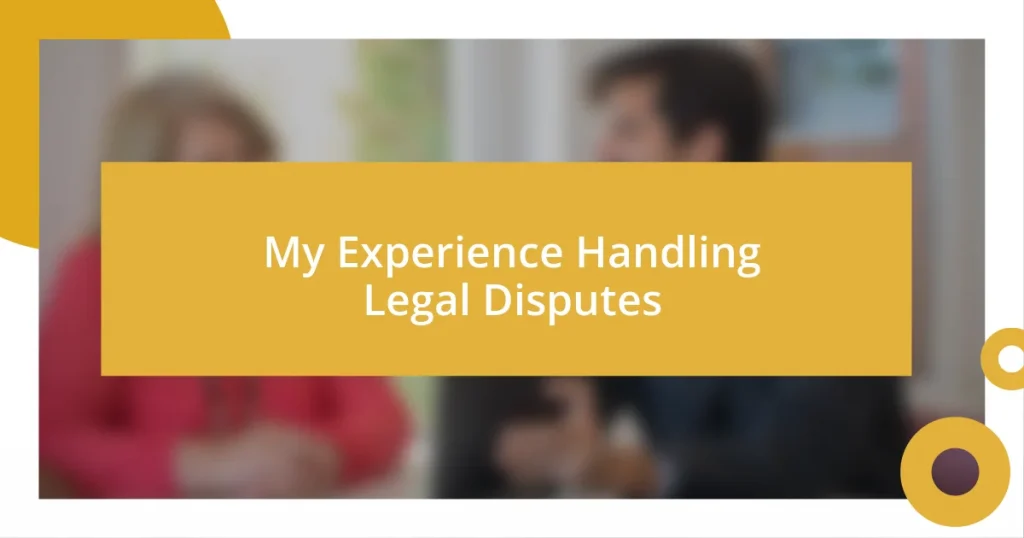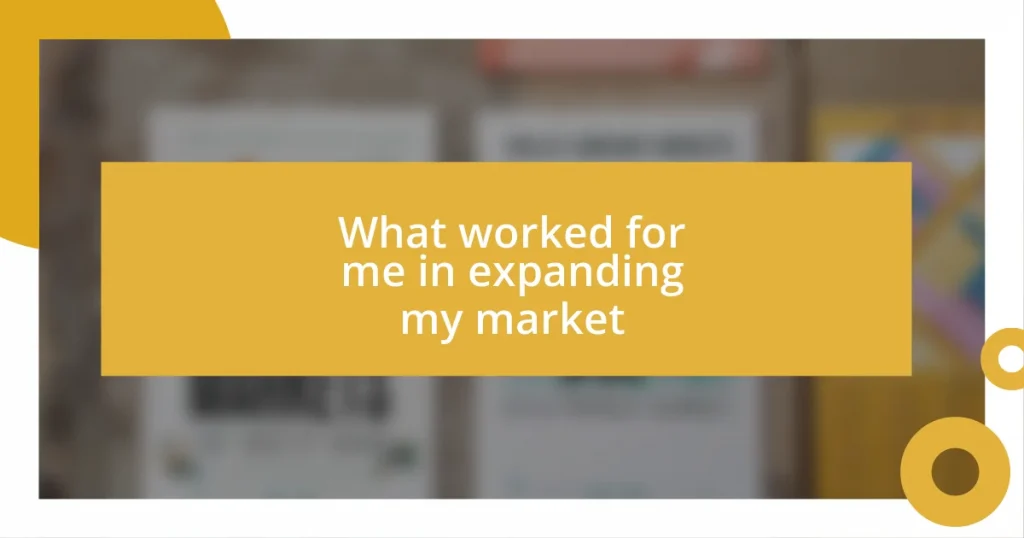Key takeaways:
- Effective communication and emotional intelligence are essential in navigating and resolving legal disputes, helping to foster understanding and reduce tension.
- Preparation and documentation are crucial first steps in managing legal conflicts, as they provide clarity and tangible evidence to support your position.
- Knowing when to seek legal help is vital; recognizing your limits can prevent escalation and protect your interests in complex situations.

Understanding Legal Disputes
Legal disputes are often rooted in misunderstandings or differing interpretations of agreements or rules. I remember a time when a contract I thought was straightforward led to a heated debate. It’s interesting how a single word can shift the entire meaning and cause friction; have you ever faced a similar situation?
When people think of legal disputes, they often envision courtrooms and lawyers in suits, but many conflicts start off as simple disagreements. I once found myself in a disagreement with a neighbor over property boundaries; it escalated into a legal issue surprisingly fast. This experience taught me that sometimes it’s easier to resolve issues through open communication before letting them sink into the murky waters of legal formalities.
Emotions can run high in legal disputes, often making resolution feel daunting. I distinctly recall feeling a mix of frustration and anxiety during my first experience with legal mediation. It made me wonder—how do our feelings impact the resolution process? Balancing emotions while navigating these challenges is crucial, and it’s something I constantly work on to foster constructive conversations.

Identifying Common Legal Disputes
Identifying common legal disputes can be quite enlightening as it helps pinpoint where misunderstandings often arise. Take landlord-tenant disagreements, for example. I faced a situation where a late payment led to accusations of breach of contract; it quickly spiraled. Such disputes highlight the importance of clear communication and well-detailed agreements.
Another prominent area involves family law, especially custody issues. I once supported a friend who was navigating a child custody battle, and witnessing the emotional toll it took was eye-opening. The arguments, often rooted in love and concern, can quickly become contentious, revealing how deeply personal stakes can complicate legal discussions.
Lastly, business disputes may arise over contract breaches or partnership disagreements. I recall feeling intense pressure during a negotiation over a partnership that fizzled due to unclear terms. This reminded me that transparency is key in any partnership to avoid conflicts that could end up in a legal battle over resources or responsibilities.
| Type of Dispute | Common Causes |
|---|---|
| Landlord-Tenant | Late payments, maintenance issues |
| Family Law | Custody battles, divorce settlements |
| Business | Contract breaches, partnership disputes |

Initial Steps in Legal Disputes
When I first encountered a legal dispute, the initial steps felt overwhelming. It’s amazing how much clarity you can gain by taking a moment to assess the situation calmly. Whether you’re dealing with a neighbor or a business partner, it’s crucial to gather all relevant documents and evidence before proceeding. I remember the sense of reassurance I felt when I compiled all my emails and agreements regarding a business misunderstanding; it turned an abstract conflict into something tangible that I could address.
Here’s how to approach the initial steps in any legal dispute:
- Identification of the Issue: Clearly define the nature of the dispute. What’s at stake?
- Gather Documentation: Collect all relevant documents, such as contracts, emails, and notes on conversations.
- Evaluate Options for Resolution: Consider whether negotiation, mediation, or another method might resolve the issue without legal proceedings.
Making a list like this can truly help demystify an often stressful situation, turning the chaos into manageable steps. Each time I’ve approached a dispute this way, I felt a little more in control, which eased my anxiety. It’s a reminder that methodical preparation can bolster confidence.

Effective Communication Strategies
Effective communication is a cornerstone in resolving legal disputes. When I faced a challenging negotiation over a service agreement, I realized that active listening was key. By genuinely focusing on what the other party was saying, I could better understand their perspective, which often diffused tension. What if we all approached disagreements with that level of empathy? I believe it could fundamentally change the outcome.
Using clear, straightforward language is essential, especially in legal matters where terminology can quickly confuse. I remember drafting a response to a formal complaint and choosing to avoid legal jargon; this made my points not only more accessible but also less intimidating. Have you ever struggled to understand a legal document? I think it’s vital to break down complicated terms into simple explanations to foster understanding on both sides.
In my experience, following up in writing after verbal discussions can solidify agreements and minimize misunderstandings. After a heated conversation with a business associate, I sent a summary email outlining what we discussed, ensuring we were on the same page. This not only added clarity but also provided a record of our conversation. Have you ever wished for a do-over in a discussion? Following up in writing often allows for that clarity we sometimes wish we could rewind to achieve in person.

Negotiation Techniques for Disputes
Negotiation is a dance, and mastering the rhythm can make all the difference. I’ve found that finding common ground is often the first step toward a successful resolution. For example, during a disagreement over a partnership’s terms, I suggested we discuss our mutual goals instead of our points of contention, which shifted the dialogue from combative to collaborative. Isn’t it fascinating how a simple change in focus can transform the energy of a conversation?
Active listening is more than just hearing—it’s about understanding. I vividly remember sitting across from a frustrated client during a contract dispute. Instead of immediately defending my position, I took a deep breath and really listened to her concerns. What emerged was a shared desire to find a sustainable solution. I realized then that by validating the other party’s feelings, I not only eased the tension but also opened a pathway for more productive dialogue.
Another technique I often apply is setting clear boundaries around discussions. In one instance, I was dealing with a particularly aggressive negotiator, and I firmly established a time limit for our talks. This small step reduced the pressure and allowed both of us to focus on our key issues without spiraling into a chaotic exchange. Have you ever found yourself losing control in negotiations? I learned that asserting boundaries can lead to a more respectful and effective negotiation atmosphere.

When to Seek Legal Help
Knowing when to seek legal help can sometimes be a daunting realization. I remember a time when I was involved in a disagreement where the stakes felt high, but I hesitated to involve a lawyer. The moment I started feeling overwhelmed by the complexity of the situation and the potential consequences, I understood that reaching out to legal professionals was not just wise, but necessary. Have you ever felt the weight of uncertainty hanging over you? That’s when I learned that the right legal guidance can clarify your options and protect your interests.
It’s crucial to recognize that not all disputes require immediate legal intervention, but specifics matter. For instance, when I was navigating a tenancy issue that was escalating without resolution, I initially tried to mediate it myself. However, once it became clear that my rights were at risk and the landlord was ignoring my concerns, I knew it was time to consult a legal expert. It’s easy to think we can handle things alone until we encounter strong opposition or unclear legal terms—wouldn’t you agree that sometimes, a little professional insight can save us a lot of heartache down the road?
Ultimately, if emotions are running high and discussions are becoming unproductive, it’s a sign that seeking legal advice might be in your best interest. I once found myself in a heated negotiation that spiraled out of control, and by the time I realized how detrimental the situation had become, I knew I needed help. Reflecting on that experience, I’ve developed a strong belief that engaging legal counsel can provide not just clarity, but also peace of mind during conflicts. Don’t you think having expert advice could act as a safety net when everything feels unpredictable?

Lessons Learned from My Experience
I’ve learned that preparation is key when navigating legal disputes. Early in my career, I faced a conflict that caught me off guard. I walked into that negotiation thinking I could rely just on my instinct. Unfortunately, without a well-researched plan, I found myself scrambling for answers, which made me appear less confident. How often do we underestimate the power of being prepared?
Another valuable lesson was the importance of emotional intelligence. I recall a situation where my emotions nearly took the reins during a dispute, resulting in a heated exchange. Recognizing this moment of vulnerability helped me understand that staying composed not only influences the outcome but also sets the tone for the other party. Isn’t it interesting how our emotional state can impact negotiations in profound ways?
Moreover, I realized that follow-ups can be transformative. After a particularly exhausting day of negotiations, I sent a brief email to the other party thanking them for the discussion. To my surprise, this small gesture opened doors for further collaboration down the road. Have you ever thought about how a simple act of kindness can shift relationships? That experience taught me that maintaining goodwill can be just as crucial as the negotiations themselves.















